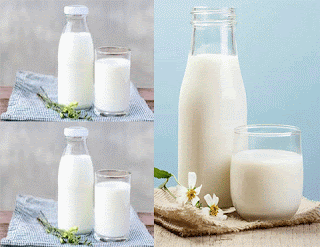The Pros And Cons of Milk:
So we need to figure out where the truth is and where the fiction is. From this article you will learn all the properties of milk and the products that can be used to replace milk, if you do not like it.
It is believed that milk provides the body with 18 out of 22 basic nutrients. It contains more calcium, magnesium, phosphorus, potassium, zinc and protein per calorie than any other food.
It is known that the fat content changes. Whole milk contains more fat than other types of milk.
It is a well-known fact that milk helps to improve bone density in children, which reduces the risk of fracture. Studies show that women who drank or ate large quantities of dairy products and products rich in calcium during pregnancy had better-sized and heavier bone weights.
In addition, it has been found that adding more dairy products to the diet for adolescent girls has also been found to be more useful for milking bones than calcium in the form of supplements. Milk also provides protein, which is essential for creating and maintaining healthy bones, teeth and muscles. A cup of milk contains about 6-7 grams of casein and whey proteins.
The glass of milk contains almost thirty percent of daily calcium intake for adults. Milk also contains potassium and magnesium. These minerals are Essential for our body and bones.
It is believed that milk can prevent type 2 diabetes. How does this work? The fact is that type 2 diabetes affects the way your body burns calories, consuming energy. Diabetes can also increase the risk of heart disease, stroke and kidney disease.
Several studies have found that whey protein in milk can help prevent type 2 diabetes in adults. This may be due to the fact that milk proteins improve blood sugar balance.
Milk fat can also help to increase the level of high-density lipoproteins known as "good" cholesterol. This helps prevent heart disease and also stroke.
In addition, milk is a good source of potassium. This mineral helps to balance the blood pressure.
But milk can also have a negative impact on your body and health in general.
Research has shown that teenagers drink more skimmed milk, which can also cause acne to be caused by dairy products. Other studies have linked this skin condition to skimmed milk, but not to domestic milk or cheese. This may be due to carbohydrates and whey protein in the milk.
It is also known that eczema is exacerbated by some products, including milk and dairy products.
More than five percent of children are allergic to milk, causing skin reactions such as eczema and intestinal problems.
Drinking three or more glasses of milk a day can increase the risk of bone fractures in women. Studies have shown that this may be due to sugars called lactose and galactose in milk.
Another study has shown that bone fractures in older people due to osteoporosis occur in those who consume more dairy products.
Excess calcium from milk and other foods can also increase the risk of prostate cancer. Even with milk sugar, the risk of developing ovarian cancer is higher.
Milk from cows with growth hormones contains higher levels of chemical substance, which can increase the risk of some cancers.
For many who do not drink milk, this is due to lactose intolerance. Cow's milk has more lactose than that of other animals. Near 75 percent of the world's people lactose narrow-minded.
Naturally, milk has the necessary nutrients. Drinking milk is especially important for children and can help you and your child stay healthy.
Dairy nutrition is changing. Milk from feed or grazing cows provides more useful fats and more vitamins.
More research is needed on the amount of milk that is most useful and the effects of antibiotics and artificial hormones that are added to the diet of cows.
Organic milk, which is free from growth hormones, is the best choice. Alternatives to milk can also be part of a healthy, balanced diet.












0 Comments
Thanks For Comments.